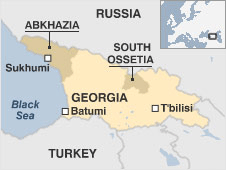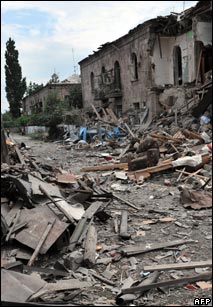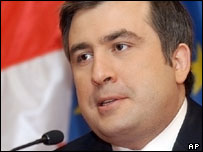Generic Medicines
Taj Pharma is the largest generic pharmaceutical company in India. We hold top positions in different established markets worldwide generics markets..
Situated at the strategically important crossroads where Europe meets Asia Georgia has a unique and ancient cultural heritage famous traditions of hospitality and cuisine and an alphabet which is entirely its own.
 |
Over the centuries Georgia was the object of rivalry between Persia Turkey and Russia before being eventually annexed by Russia in the 19th century.
Since emerging from the collapsing Soviet Union as an independent state in 1991 Georgia has again become the arena of conflicting interests this time between the US and a revived Russia. Tense relations with Russia have been further exacerbated by Moscow's support for the separatist regions of Abkhazia and South Ossetia.
Georgia's previous and rather brief interlude of independence after the 1917 Bolshevik revolution in Russia ended when it was invaded by the Soviet Red Army in 1921 and incorporated into the Soviet Union a year later.

Conflict over Georgia's separatist regions raised fears of a new Cold War
|
The US now has a major strategic interest in the country having invested heavily in an oil pipeline from Azerbaijan via Georgia to Turkey. The Georgian armed forces have been receiving US training and support.
Increasing US economic and political influence in the country has long been a source of concern for the Kremlin as have Georgia's aspirations to join NATO and the EU.
Tensions between Moscow and Tbilisi are never far from the surface and in August 2008 flared up into an armed conflict triggered by clashes between Georgian troops and South Ossetian separatist forces.
Post-Soviet years
Following the collapse of communism in the USSR in 1991 Georgians voted overwhelmingly for the restoration of independence and elected nationalist leader Zviad Gamsakhurdia as president. However Gamsakhurdia was soon overthrown by opposition militias which in 1992 installed former Soviet Foreign Minister Eduard Shevardnadze as the country's new leader.
During his 11 years in office the Georgian people felt increasingly at the mercy of poverty corruption and crime. He was ousted in November 2003 following mass demonstrations over the conduct of parliamentary elections.
Once a relatively affluent part of the USSR with independence Georgia lost the cheap energy to which it had access in the Soviet period. As relations between Georgia and Russia deteriorated Moscow did not flinch from tightening the
economic screws and the rupturing of trading ties caused the Georgian economy to nose-dive.
Georgia has been heavily dependent on Russia for its energy supply. Like some other republics of the former Soviet Union it saw the price of gas supplied by the Russian gas giant Gazprom rise sharply in January 2006. Gazprom has since doubled the price again. It is no coincidence that Georgia has started receiving an increasing proportion of its gas from Azerbaijan.
Breakaway regions
Since independence the people of Georgia have endured periods of civil war and unrest as well as violence related to the independence aspirations of the breakaway regions of Abkhazia and South Ossetia. Both regions had close ties with Moscow which in August 2008 announced it was formally recognising their independence.
Russian troops had operated there since the early 1990s and were regularly accused by Georgia of siding with the separatists.
President: Mikhail Saakashvili
Mikhail Saakashvili was elected president in January 2004 and won a second term in an early election in January 2008 called in response to opposition protests.

Mikhail Saakashvili
|
In 2004 Mr Saakashvili led the ''Rose Revolution'' protests which forced his predecessor as president Eduard Shevardnadze to resign riding a wave of popular anger at a parliamentary rigged election.
He won an overwhelming majority in the subsequent presidential election in what OSCE observers described as a "welcome contrast" to the parliamentary poll.
Soon after that Mr Saakashvili consolidated his position when his National Movement-Democratic Front won a resounding victory in parliamentary elections.
He faced a major challenge towards the end of 2007 when a one-time ally former defence minister Irakli Okruashvili accused him of corruption and of plotting a murder.
The accusations triggered a wave of protests. Mass demonstrations were held in Tbilisi demanding elections. The opposition accused him of being authoritarian and not doing enough to alleviate poverty.
Mr Saakashvili sent in the riot police imposed a state of emergency and alleged there was a hidden Russian hand in the unrest.
He also brought forward presidential elections to 5 January 2008 proceeding to win an outright victory with more than 50% of the vote.
Mr Saakashvili further consolidated his position when his party won a landslide victory in parliamentary elections in May 2008.
And the outbreak of armed conflict with Russia in August 2008 led many Georgians who had previously accused Mr Saakashvili of exhibiting authoritarian tendencies to rally behind him.
His long-term prospects are less certain as in future Georgia is likely to be far worse off - both strategically and economically - as a result of the war.
The sense of political uncertainty was heightened in April 2009 when the authorities said an army unit had mutinied as part of a Russian-backed coup attempt. Moscow denied the allegations.
A protégé of Mr Shevardnadze early in his career Mr Saakashvili grew disillusioned by widespread corruption in high places. He became justice minister in 2000 and launched a high-profile campaign against it sparking a major public row with Mr Shevardnadze.
On becoming president Mr Saakashvili vowed to restore Georgia's territorial integrity by returning the breakaway regions of Abkhazia and South Ossetia to the fold. Moscow's links with both have been a constant bone of contention.
His ambition to take Georgia into Nato and the EU further soured relations with the Kremlin.
Mr Saakashvili was born in Tbilisi in 1967. He trained as a lawyer in the US and other countries and became a member of the Georgian parliament in 1995. He speaks several languages including fluent English.
Prime Minister: Nikoloz "Nika" Gilauri
A business manager and long-serving minister Nika Gilauri became prime minister in February 2009. He succeeded Grigol Mgaloblishvili who resigned on health grounds after only three months in office.
Born in Tbilisi in 1975 Mr Gilauri studied business and finance in Ireland and the United States and worked as a manager abroad and in Georgia.
He joined the government as energy minister in 2004 after the election of President Mikhail Saakashvili and went on to negotiate major gas supply deals with Azerbaijan Iran and Turkey.
He took over as finance minister in September 2007 combining the job with the newly-created post of first deputy prime minister in Mr Mgaloblishvili's government from November 2008.
Mr Gilauri said that his priorities would be to tackle unemployment further democracy and work to bring Abkhazia and South Ossetia under Georgian control. He repeated previous governments' commitment to Georgia's integration with NATO.
His first major step was to dismiss Kakha Bendukidze an entrepreneur who made a fortune in Russia in the 1990s and later spearheaded Georgia's privatisation drive as head of the Georgian State Chancellery.
Mr Bendukidze's role in the deregulation of the Georgian economy had made him a regular target of opposition criticism and had also brought him into conflict with Mr Gilauri.
Television is the main source of news. There are dozens of cable operators and a handful of major commercial stations.
Private broadcasters compete for a share of the small but growing advertising market. Newspaper readership is generally low.
Government-funded Georgian Public Broadcasting has replaced the former state radio and TV. The state has relinquished other media assets including newspapers and a news agency.
The constitution provides for freedom of speech and journalists often criticize officials. However in late 2007 Reporters Without Borders criticized the suspension of news on private TVs under a state of emergency as well as the closure of opposition-leaning Imedi TV which stayed off air for five months.
The government is "intent on securing government-friendly ownership and management at national TV stations" US-based Committee to Protect Journalists said in June 2008.
There were some 360000 internet users by March 2008 (Internetworldstats). The armed conflict between Russia and Georgia in July-August 2008 saw attacks on web-based assets belonging to both sides.
The press
Television
Radio
News agencies/internet
Civil Georgia - news site run by United Nations Association of Georgia
AFRICA | ASIA-PACIFIC | AMERICAS | EUROPE | MIDDLEEAST | SOUTHASIA
![]()
![]()
![]()
Mauritania Mauritius Morocco Mozambique Namibia Niger Nigeria Republic-of-congo Rwanda Sao-tome-and-principe Senegal Seychelles Sierra-leone Somalia South-africa Sudan Swaziland Tanzania The-gambia Togo Tunisia Uganda Australia Brunei Burma Cambodia China East-timor Fiji Indonesia Japan Kazakhstan Kiribati Kyrgyzstan Laos Malaysia Marshall-islands Micronesia Mongolia Nauru New-zealand North-korea Palau Papua-new-guinea Samoa Singapore Solomon-islands South-korea Taiwan Tajikistan Thailand The-philippines Tonga Turkmenistan Tuvalu Uzbekistan Vanuatu Vietnam Antigua-and-barbuda Belize Bolivia Brazil Canada Chile Colombia Costa-rica Cuba Dominica Dominican-republic Ecuador El-salvador Grenada Guatemala Guyana Haiti Honduras Jamaica Mexico Nicaragua St-kitts-and-nevis St-lucia Suriname Trinidad-and-tobago Uruguay Venezuela Albania Andorra Armenia Austria Azerbaijan Belarus Belgium Bosnia-hercegovina Bulgaria Croatia Cyprus Czech-republic Denmark Estonia Finland France Georgia Germany Greece Hungary Iceland Ireland Italy Latvia Liechtenstein Lithuania Luxembourg Macedonia Malta Moldova Monaco Montenegro Norway Poland Portugal Russia San-marino Serbia Slovakia Slovenia Spain Sweden Algeria Egypt Iran Iraq Israel-and-palestinian-territories Jordan Kuwait Lebanon Libya Mauritania Oman Saudi-arabia Sudan Syria Tunisia United-arab-emirates Yemen Afghanistan Bangladesh Bhutan India Nepal Pakistan Sri-Lanka The-Maldive